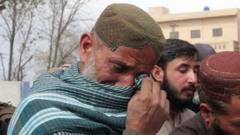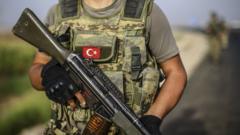The hijacking of the Jaffar Express in Pakistan left passengers in a desperate fight for survival. After armed militants bombed the tracks and stormed the train, many were taken hostage, leading to over 30 hours of terror. Eyewitnesses recount scenes of violence, while military operations resulted in the rescue of 300 passengers. However, the fate of over 140 individuals remains uncertain.
The Terrifying Hijacking of the Jaffar Express: A Survivor’s Tale

The Terrifying Hijacking of the Jaffar Express: A Survivor’s Tale
In a shocking incident in Pakistan's Balochistan province, armed militants hijacked the Jaffar Express, leading to chaos and fear among passengers. Eyewitness accounts reveal the harrowing realities of survival amidst violence.
The events on the Jaffar Express have highlighted the grave security issues in the volatile region of Balochistan, where insurgent groups like the Balochistan Liberation Army (BLA) have a long history of attacks against the state. Travelers aboard the train were caught in a nightmare when militants bombed the railway, opening fire onto the passengers and taking control of the carriages.
Eyewitness Mehboob Hussain recalled the terrifying moment the train came to an abrupt stop. "I was a passenger on the train that was attacked," he reported, describing the explosion and ensuing gunfire. As people screamed and ducked for cover, panic spread among the 440 passengers. The BLA claimed responsibility soon after, threatening mass executions if their demands for the release of political prisoners were not met within 48 hours.
The chaos ensued for more than 30 hours before a military rescue operation began. As families desperately waited, more than 300 individuals were ultimately freed. However, the aftermath was grim, with casualties reported, including both civilians and armed forces.
Eyewitness accounts illustrate a scene of horror onboard. Some passengers described efforts to fight back while others were separated according to ethnicity and threatened by the militants. "They started checking cards and telling people to go this way, this way," explained a railway police officer who was on board. Tragically, some passengers were killed, including Allahditta’s cousin, who pleaded for his life.
Amidst the chaos, initial negotiations led to some hostages being released, including women, children, and locals. Survivors shared their terrifying escape during a military assault, with gunfire ringing out as they fled the train. Despite efforts by the military, the status of over 140 passengers remains unclear, raising grave concerns about their safety amidst the ongoing violence in Balochistan.
Rescue operations continue, with authorities pledging that they will seek justice for the victims. Meanwhile, many survivors like Noor Muhammad express their gratitude for having returned home safely, forever marked by the traumatic experience they endured aboard the Jaffar Express. The situation in Balochistan highlights ongoing insecurities, raising questions about governance in a region long neglected by the central government.
The disturbing accounts of survival reflect the grim reality faced by civilians in conflict zones, emphasizing the urgent need for safety and security in areas afflicted by ongoing violence and unrest.
Eyewitness Mehboob Hussain recalled the terrifying moment the train came to an abrupt stop. "I was a passenger on the train that was attacked," he reported, describing the explosion and ensuing gunfire. As people screamed and ducked for cover, panic spread among the 440 passengers. The BLA claimed responsibility soon after, threatening mass executions if their demands for the release of political prisoners were not met within 48 hours.
The chaos ensued for more than 30 hours before a military rescue operation began. As families desperately waited, more than 300 individuals were ultimately freed. However, the aftermath was grim, with casualties reported, including both civilians and armed forces.
Eyewitness accounts illustrate a scene of horror onboard. Some passengers described efforts to fight back while others were separated according to ethnicity and threatened by the militants. "They started checking cards and telling people to go this way, this way," explained a railway police officer who was on board. Tragically, some passengers were killed, including Allahditta’s cousin, who pleaded for his life.
Amidst the chaos, initial negotiations led to some hostages being released, including women, children, and locals. Survivors shared their terrifying escape during a military assault, with gunfire ringing out as they fled the train. Despite efforts by the military, the status of over 140 passengers remains unclear, raising grave concerns about their safety amidst the ongoing violence in Balochistan.
Rescue operations continue, with authorities pledging that they will seek justice for the victims. Meanwhile, many survivors like Noor Muhammad express their gratitude for having returned home safely, forever marked by the traumatic experience they endured aboard the Jaffar Express. The situation in Balochistan highlights ongoing insecurities, raising questions about governance in a region long neglected by the central government.
The disturbing accounts of survival reflect the grim reality faced by civilians in conflict zones, emphasizing the urgent need for safety and security in areas afflicted by ongoing violence and unrest.






















